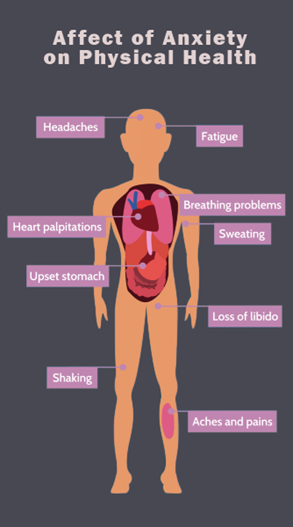Anxiety Remedies: How Dietary Changes Can Reduce Stress
What is Anxiety?
Anxiety disorder involves excessive fear and worries about otherwise normal conditions. It alters your normal response to life activities and how you behave under certain circumstances. It is the most common among all mental disorders and its prevalence is increasing day by day.
What Anxiety Does to Your Body?
Everyone goes through anxiety at some point in their lives. Along with changes in your behavior and emotional state, anxiety also alters how your body functions. Some of the serious consequences of anxiety on your body are given below:
1. Digestive System Issues: The nerves in your digestive lining are connected with the brain and control its functioning. The common digestive issues faced during stress include IBS (irritable bowel syndrome), Bloating, Crohn’s Disease, etc.
2. Unintentional/Sudden Weight gain or loss: There is a strong gut-brain connection. When you are stressed or anxious, your appetite decreases drastically. If this condition exists for a long time it leads to serious and severe weight loss. In some cases, people start binge eating in order to get rid of their thoughts. This can lead to abrupt weight gain as well.
3. Constant Headache: Having a headache is a common symptom of anxiety and stress. People who think a lot develop migraine or severe headaches. It makes you irritable and you stay frustrated and angry all the time.
4. Insomnia: The National Sleep Foundation's research showed that your mental health has a direct relationship with your sleep quality and quantity. When you are suffering from anxiety your sleep is disturbed or some even stay awake all night leading to insomnia.
5. Cardiovascular Issues: During an episode of stress, the body releases stress hormones (Cortisol and Adrenaline) that are responsible for the fight or flight response. This is the common response of the body to any stressful situation, but if a person is constantly in a state of stress or anxiety it leads to great stress on the heart and causes high blood pressure.
6. Respiratory Problems: During stress, you may go through panic attacks. In this situation, it becomes difficult to breathe properly. Anxiety can worsen the already existing asthma.
7. Decreased Sexual Drive: Anxiety causes loss of libido leading to decreased sexual drive.
Nutrition and Stress
Good nutrition is really an important tool in the management of stress. There are certain chemicals present in your food that can fight against stress. Choice of nutrients is extremely important in managing your stress, as some foods can trigger it as well. Following are some remedies to fight stressful conditions:
Herbal Teas
Herbal teas are a great source of beneficial phytochemicals like flavonoids that promotes brain health. Warm teas have a very relaxing effect on the body, they calm your nerves and make you feel energetic and positive. Non-herbal teas can also play a role in
Dark Chocolate
Dark chocolate helps release stress in two ways, through its chemical function and its emotional effect. It contains antioxidants that help lower the stress hormones in your body thus lowering the stress. It also releases happy hormones like serotonin which boost your mood. Eating a piece of chocolate gives you an amazing feeling and is relieving in itself.
Whole Grains:
Research has shown that taking carbohydrate-rich food increases the serotonin level in the body which boosts your mood. It helps improve your focus and make you more attentive. Choose whole grains and avoid refined carbs. They are high in fiber and helps improve digestive health as well.
Fish:
Fish, especially fatty fish is a good source of omega-3 fatty acids that has a very important role in improving our brain and heart health. The nutrients interact with the chemicals coming from the brain in easing depression or stress. It is also heart-friendly and improves its functioning. Try to choose oily fish like tuna, salmon, herring, etc. Those who don’t like fish can choose healthy nuts or seeds like walnuts, flaxseeds, chia seeds, etc.
Bedtime Milk:
Taking a glass of warm milk before bedtime helps you have a sound sleep at night. It has a very relaxing effect on your body overall. Calcium and vitamin D present in milk helps relax muscles and stabilize your mood. People who don’t like milk can choose the alternatives like yogurt, cheese, etc.
Role of Magnesium in Stress:
Magnesium is an important mineral and has a very beneficial role in managing stress. It blocks the neurotransmitters that stimulate stress. Magnesium reduces anxiety by improving brain function. Stress is not always a bad thing. The key is to balance stress in your life. Research has shown that magnesium regulates the part of the brain called the hypothalamus that controls the release of stress hormones. People with anxiety can take magnesium supplements for lowering the symptoms of anxiety.
Food sources of Magnesium:
ü Leafy green vegetables
ü Avocados
ü Whole Grains
ü Legumes
ü Nuts and Seeds
ü Dark Chocolate
You can use diet as part of the management of your stress levels and to help balance anxiety in your life. Food also is a great way of sharing experience with other people and can bring people together in a way that feels supportive. Feeding yourself good, high quality foods is also simply doing something really nice for your body, so be really nice to your self today. You deserve it!




